Cestodes - PowerPoint PPT Presentation
1 / 48
Title:
Cestodes
Description:
Freezing meat below 10 C. Fish Tapeworm. Diphyllobothrium latum ... Freezing for 24 hours and pickling kills the tape. Diphyllobothriasis: Treatment ... – PowerPoint PPT presentation
Number of Views:745
Avg rating:3.0/5.0
Title: Cestodes
1
Cestodes
- Gregory L. Brower, D.V.M., Ph.D.
- Cell Biology and Anatomy
- School of Medicine
- Columbia, South Carolina
2
(No Transcript)
3
Cestodes (Tape Worms)
- Taenia solium (pork tapeworm) - Cysticercus
- Taenia saginata (beef tapeworm)
- Diphyllobothrium latum (fish tapeworm)
- Echinococcus granulosus (unilocular hydatid)
- Echinococcus multilocularis (alveolar hydatid)
- Hymenolepis nana (dwarf tapeworm)
- Hymenolepis diminutia
- Dipylidium caninum
4
General Structure of Tapeworm
- Head region (scolex) contains suckers and hooks
used to attach to a host organism. - Proglottids square body segments used for
reproduction.
5
Tapeworm Structure
- Scolex - Attachment organ
- Zone of Proliferation - Undifferentiated area
behind the scolex (neck region) - Strobilia - Chain of segments (proglottids)
- Immature proglottids - developing reproductive
- Mature proglottids mature reproductive organs.
- Gravid proglottids contain eggs in the uterus.
6
Immature Segment
- note that the reproductive organs are just
beginning to differentiate. - (Carmine stained)
Developing reproductive organs
7
Mature Segments (Proglottids)
- Tapeworms are Hermaphroditic
8
TaeniasisGeographic Distribution
- Worldwide, depending on dietary habits, and
quality of cattle and pork farming.
9
Taenia saginata and T. soliumScolex And
Proglottids
10
Taenia solium (Pork Tapeworm) Morphology
- Adult Worm
- 2-4 m long,
- 700-1000
- segments
- Scolex
- Neck
- Immature segment
- Mature segment
- Gravid segment
11
Cystcercus cellulosae in Muscles of Pigs
12
Cysticercus cellulosae
- It is soybean-like in shape, with the
small scolex invaginated into the translucent
cyst (left). - The scolex evaginated from the cyst (right).
Cysticercius cellulosae
13
Taenia eggs
- The eggs of Taenia saginata and T. Solium are
morphologically indistinguishable.
14
TaeniasisLife Cycle
15
TaeniasisLife Cycle
16
Life Cycle
17
TaeniasisSymptoms
18
Cysticercosis
19
TaeniasisDiagnosis
- Symptoms
- History of eating undercooked beef or pork
- Recovery of proglottids and/or eggs in the stool
20
CysticercosisDiagnosis
- CNS and/or symptoms involving other organs
- History of ingesting food with T.solium eggs
- Radiographic localization of cysticercal lesions
in tissues
21
CysticercosisDisease
Cerebral cysticercosis
22
CysticercosisDisease
- Cardiac cysticercosis
Ocular cysticercosis
23
TaeniasisTreatment and Prevention
- Treatment
- Praziquantel scolex expulsion is essential
- Prevention
- Adequate cooking of meat
- Freezing meat below 10º C
24
(No Transcript)
25
Fish TapewormDiphyllobothrium latum
Distributed worldwide freshwater (great lakes)
26
Diphyllobothrium latum Morphology
27
Diphyllobothrium latum Life Cycle
28
DiphyllobothriasisSymptoms
Site
Symptoms
Pathogenesis
gastro-intestinal
abdominal discomfort, rarely severe cramping
pain, diarrhea alternated by constipation,
vomiting
related to worm burden
weight loss, vitamin B-12 deficiency
physical mass and inflammation
general
29
DiphyllobothriasisDiagnosis
- symptoms
- history of eating raw fish
- recovery of proglottids and/or eggs in the stool
30
DiphyllobothriasisTreatment
- Praziquantel is the drug of choice
- Avoid uncooked fish from infested waters
- Freezing for 24 hours and pickling kills the tape
31
Hymenolepis nana (Dwarf Tape Worm)Morphology
32
Hymenolepis nana (Dwarf Worm)Life Cycle
33
Hymenolepis nana (Dwarf Worm)Symptoms
- Lighter infections mild abdominal disturbance
- Heavier infections enteritis
34
Hymenolepis nana (Dwarf Worm)Diagnosis,
Treatment And Control
Diagnosis rodent infestation ova in the
feces Treatment and Control Praziquantel is the
drug of choice rodent population control
35
Echinococcus granulosus (hydatid)Geographic
Distribution
36
Echinococcus granulosus (hydatid)Case History
- 32-year-old Kenyan woman presented in Boston with
a 3-month history of cough that was initially
productive of thick, gray sputum that had
gradually become blood-tinged. She had low-grade
fevers. Chest radiography revealed an apparent
elevation of the right hemidiaphragm. CT scan the
chest with contrast medium revealed a low-density
cystic mass measuring 13 by 13 by 10 cm in the
right lower hemithora.
37
Echinococcus granulosus (hydatid)Case History
- Ultrasound-guided aspiration of the contents of
the cyst yielded clear, colorless fluid
containing a protoscolex of Echinococcus
granulosus. Three days later, cystectomy was
performed, with the use of specific precautions
to prevent local spread of disease. After
adequate antiparasitic treatment, follow-up
radiography demonstrated reexpansion of the right
lung. The patient has returned to her normal
level of activity, and there is no evidence of
recurrent disease.
38
Echinococcus granulosus (hydatid)Morphology
39
Echinococcus granulosus Life Cycle
40
Echinococcus granulosus Life Cycle
http//workforce.cup.edu/buckelew/
41
Echinococcus granulosus Symptoms
42
Echinococcus granulosus Diagnosis
- Endemicity
- Symptoms
- X-ray and CT scan
- Serology
- Skin (Casoni) test
43
Echinococcus granulosus Treatment and Control
- Surgical removal of the cyst
- Praziquantel
- Avoidance or treatment of infected canine
44
Echinococcus multilocularis (hydatid)Geographic
Distribution
45
Echinococcus multilocularis
- Similar to E. granulosus, except
- Secondary hosts and reservoir are rodents.
- The egg produces multilocular cysts.
- The cestode is more resistant to chemotherapy.
46
Echinococcus multilocularis Treatment and
Control
- Surgical removal of the cyst
- Resistant to praziquantel Albendazole has some
effect - Avoidance control of rodent population
47
Hydatid Cysts
48
(No Transcript)































